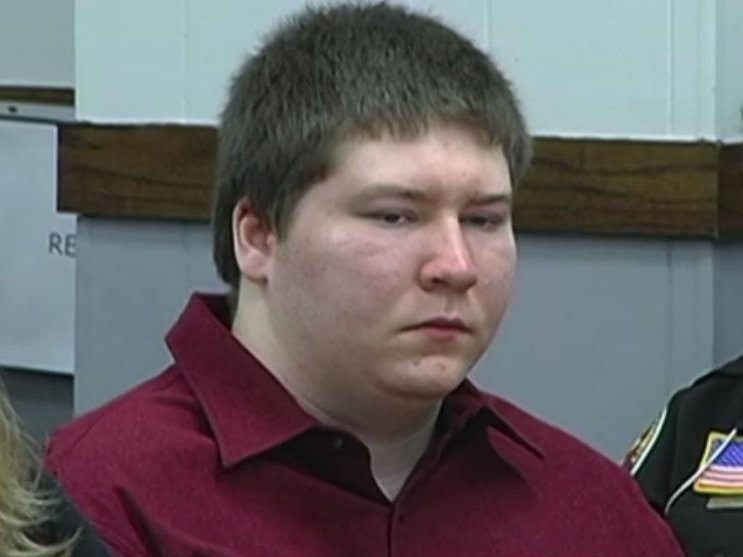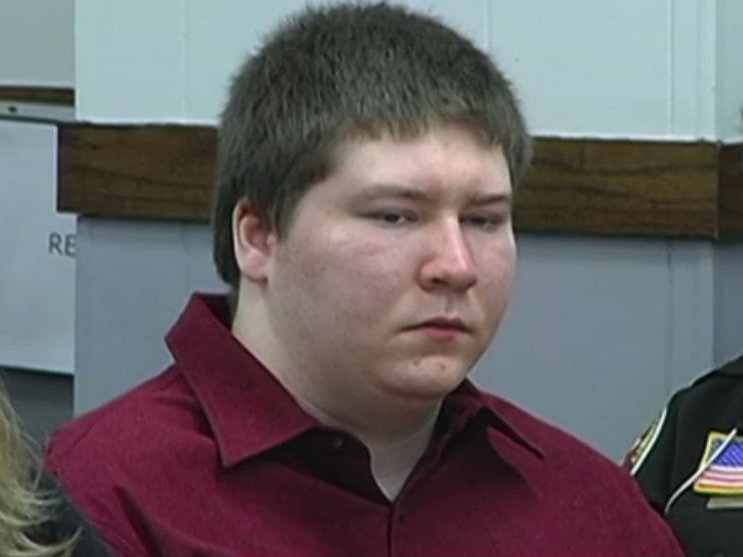In contrast to the "dream team" of Dean Strang and Jerry Buting – who are gaining quite a devoted, almost fawning following among "Making a Murderer" addicts – Brendan Dassey’s first defense attorney, Len Kachinsky, comes across like one of the slimiest villains of the Netflix show.
But is he?
Other than former prosecutor Ken Kratz, Kachinsky is the guy everyone loves to hate and whom the Internet hordes are bashing most (and with some good reason). Kachinsky was the annoying, devious seeming Wisconsin defense attorney for Dassey, Steven Avery’s 16-year-old cognitively slow nephew.
In the docuseries, the Appleton lawyer seems to excessively grin at all the wrong times, especially when he’s reminded the media are interested in him. Some commentators have even dubbed him "evil incarnate." He gets the lion’s share of the Netflix blame for Dassey’s ultimate conviction. (The person who is evil incarnate is the person who murdered and burned Teresa Halbach.)
But is it possible to defend the hapless, demonized Len Kachinsky? I think – when it comes to the former JAG Corps lawyer, cancer survivor and marathoner - it’s more complicated than the documentary depicts (which is proving true of lots of things in it). That doesn’t mean that I think Kachinsky handled everything perfectly. I don’t. I also think that Dassey, in the interest of justice, should probably get a new trial for a variety of reasons.
Still, consider:
Kachinsky was trying to line up a plea deal that could have gotten 16-year-old Dassey 15 years. Nothing to sneeze at, but the kid would have been out in a couple years now if he (and his mother) hadn't gotten Kachinsky fired. His later attorneys went with the "I didn't do it defense" the Internet is clamoring for – and faced with the mountain of details in the flawed confession(s) – got their client life with parole eligibility in 41 years.
I think the timeline also matters here.
The Wisconsin Court of Appeals decision upholding Dassey’s conviction states that law enforcement officers first interviewed Dassey on Feb. 27, 2006 at his high school and conducted a second videotaped interview at the Two Rivers Police Department. The decision states that Dassey’s mother, Barb Janda, "agreed to the second interview but declined the offer to accompany Dassey. On March 1, again with Janda’s permission, officers retrieved Dassey from school for a videotaped interview."
Yet, Dassey’s mother is painted like the heroine of the Netflix series, in contrast to the villainous defense attorney who wasn’t even his lawyer yet when the above interviews occurred. It was possible to shape a different narrative, had the documentarians wanted to do so.
Keep in mind – and this is important and worth repeating – that according to the Appeals Court decision, Kachinsky was appointed to represent Dassey shortly after he was charged in March 2006. The state court website says Kachinsky entered the case on March 7, 2006. Altogether, he’s had 8 lawyers (some of them appellate). Another lawyer represented him from March 2-6, according to CCAP.
That means that Dassey had already talked to law enforcement – had already confessed – because his mother let him talk to the cops without being present and without a lawyer being present; this was the hand that Kachinsky was dealt as a defense attorney when he took the case.
I think it would be different if Kachinsky was the lawyer before Dassey had ever talked to the cops and let him do so without a lawyer at that point. Clearly it was not in Dassey’s interest to ever talk to the cops. By the time Kachinsky came on board, he already had. Did Kachinsky compound things by letting Dassey talk to them again? Well, it’s outrageous for a defense attorney to allow his client to talk to the cops without the lawyer being present at any point, as Kachinsky later did. That part’s clear. So I am not arguing that was OK.
The public defender’s officer even decertified Kachinsky’s status to handle cases at that time as a result. In his appeal of his public defender decertification, Kachinsky argued in part that this meeting between law enforcement interrogators and Dassey was not admissible in court anyway. In other words, the cops already had all those other confessions taken before Kachinsky was even involved.
As to the possible plea deal, maybe Kachinsky realized that, in an insular town like this, and with the heated emotions surrounding this trial, and with all of the details in those hours of confession – even some that didn't match the forensic evidence, like where was the victim's blood? – he was going to do his best to stop his client from spending his life in prison. The attempt to seek a plea deal gets painted by critics solely as Kachinsky being in cahoots with the state and trying to bolster their case. Isn’t it possible that, in light of the confessional evidence, a plea deal was in Dassey’s best interest at that point? Again, consider the end result … I think it’s at least arguable.
Your client "confesses" on videotape to horrifically murdering and raping a woman in a high profile case, and you might be able to get a deal for 15 years out of the state? You take that and run, some might say.
Again: I get it, I get it. Dassey insisted he didn't do it. He might not have, and his lawyer had an obligation to listen to that and let his client make up his own mind, despite how young he was – and to explore the validity of the confession more thoroughly - and you never, ever let your cognitively challenged, teenage client talk to the cops without a lawyer present (the defense private investigator is another story; the segment of video with him was particularly shocking).
Kachinsky testified that "he hoped to get the best deal he could for Dassey" but Dassey’s family was pressuring him not to (consider that he had to also consider that Dassey’s mother was the sister of the guy who would be hurt if Dassey took the plea, so the family might have had mixed motives. The documentary doesn’t explore this possibility).
Of course, some of the evidence presented at trial against Dassey also came from the very weird private investigator for Kachinsky who appears on videotape at one point to be manipulating Dassey into turning an "I didn’t do it" statement into "I did, and here’s some diagrams besides." I do think it was incumbent of the defense team to not manipulate what came out of Dassey’s mouth and that videotaped scene, was to me, one of the most troubling scenes in the entire documentary. The defense PI came across as very weird.
Another key argument against Kachinsky is that he told the media that Dassey was manipulated by his uncle. Again, in lieu of the detailed confession (which went on for hours), I don’t think this sounds like an unreasonable line of defense. If he was involved at all, the older uncle is clearly the nefarious actor, and the nephew the dim-witted pawn. It made sense for Kachinsky to try to shape public opinion to see Dassey in that light. However, Kachinsky also told the media his client was "morally and legally responsible" before arguing for his reduced culpability; that statement was wrong and prejudicial to Dassey.
I personally hope that Dassey gets a new trial; his case is currently in federal court and he’s seeking one. That’s because all of the above aside, I am far from convinced that Dassey had anything to do with this and am less convinced even more so that what actually happened matched his "confessed" version of events.
If Teresa Halbach was brutally murdered in the Avery residence, as Dassey stated, why didn’t they find a single speck of her blood in his bedroom? And so forth. The forensic evidence – or really lack thereof – actually conflicts with the Dassey confession in key ways. They didn’t find Dassey’s DNA or prints anywhere. Of course, Dassey also told the authorities that his uncle had lifted Halbach’s car hood; they then found DNA from Avery’s sweat under it. And Dassey had bleach on his pants from allegedly trying to help his uncle clean up the garage. That’s why I’d like to see a new trial, not an outright exoneration.
Dassey deserved counsel in the room. And the actions of the defense private investigator are beyond troubling. In the interest of justice, I think Dassey deserves a do-over. He came across like an easily manipulated low IQ youth who kept telling different people what he thought they wanted to hear.
But Kachinsky may not be the simplistic villain of this narrative. He is, minimally, a more complex human character. According to his Facebook page, Kachinsky studied law at UW-Madison, and is also a municipal judge at the Town of Menasha. For years, he was an active duty U.S. Army JAG Corps officer.
According to his Town of Menasha bio, Kachinsky is also a lay minister, serves as a volunteer for various veterans and running organizations, and was activated once for Operation Desert Storm and twice for Operation Enduring Freedom. He retired as a lieutenant colonel in 2007. He is a survivor of multiple myeloma cancer and has run 73 marathons since 2012.
Wait. 73??
One of his most recent Facebook posts, made just as people on the Internet were about to start eviscerating him, was about feeling anxious while visiting a UW cancer treatment center. He had a bone marrow transplant in 2007. He noted, "2015 ended with a bang followed by 7 weeks of hospitalization." Yet he’s still running marathons.
That doesn’t mean he’s incapable of being a bad lawyer. Rather, I bring all of this up to point out that he is, like everyone in this series, not solely a simplistic grinning villain/media hog.
The Netflix version of the Avery case is like any other movie script; it needed to boil things down into a black-and-white narrative script, complete with odious villains and heroines/heroes. We should remember that.
Jessica McBride spent a decade as an investigative, crime, and general assignment reporter for the Milwaukee Journal Sentinel and is a former City Hall reporter/current columnist for the Waukesha Freeman.
She is the recipient of national and state journalism awards in topics that include short feature writing, investigative journalism, spot news reporting, magazine writing, blogging, web journalism, column writing, and background/interpretive reporting. McBride, a senior journalism lecturer at the University of Wisconsin-Milwaukee, has taught journalism courses since 2000.
Her journalistic and opinion work has also appeared in broadcast, newspaper, magazine, and online formats, including Patch.com, Milwaukee Magazine, Wisconsin Public Radio, El Conquistador Latino newspaper, Investigation Discovery Channel, History Channel, WMCS 1290 AM, WTMJ 620 AM, and Wispolitics.com. She is the recipient of the 2008 UWM Alumni Foundation teaching excellence award for academic staff for her work in media diversity and innovative media formats and is the co-founder of Media Milwaukee.com, the UWM journalism department's award-winning online news site. McBride comes from a long-time Milwaukee journalism family. Her grandparents, Raymond and Marian McBride, were reporters for the Milwaukee Journal and Milwaukee Sentinel.
Her opinions reflect her own not the institution where she works.







